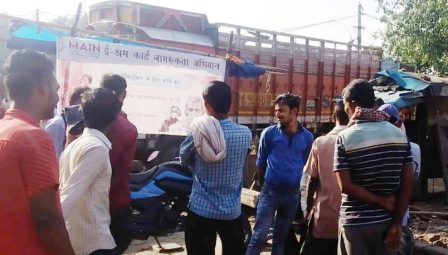Hundreds of migrant workers in the states of Delhi and Kerala have been linked to a special Government portal that will give them access to various government services across the country, thanks to an initiative by the Jesuit Conference of India, and more will follow.
The campaign started by the Migrant Assistance and Information Network (MAiN) a fortnight ago, on October 26, in the form of an awareness camp at Golden Park Slum, in the Indian capital, has attracted hundreds of workers as it continues.
“The e-Shram portal and the e-Shram card is considered as a major effort on the part of the government to recognise more than 40 crore unorganised sector workers in the country,” says Surbhi, a Jesuit collaborator based in Delhi.
The e-Shram portal provides all the registered workers an e-Shram card containing a 12-digit UAN (Universal Account Number), and they can access benefits of government schemes even if they are working outside their native province.
In Kalady at Ernakulam in Kerala state, 120 interstate migrants got registered on the first day, and in Delhi about a hundred.
Over 1,800 people attended the awareness camps over the week in Delhi, according to Father Shin Kallungal SJ, Assistat director of MAiN. “E-shram Portal is a step towards recognising the invisible workers in India”, he told Newsnet.
The campaign is in its infancy, and will soon unfold in Jesuit provinces across India, he said.
The campaign team answered the queries of the local people. The workers were excited about the campaign and registration, that MAiN volunteers provided for on-the spot and free-of- cost. Registration costs about Rs 250 at privately run registration assistance centres. The team reached out to more than more than 100 unorganised sector workers on the first day.
MAiN has planned for a larger outreach among workers for greater awareness on the -e-Shram card. It aims to have a large number of unorganised sector migrant workers registered on the portal over by December end.
Some of the locations for the awareness campaigns and registration include areas such as Jehangirpuri, Samaypur Badli, Azadpur, Punjabi Bagh, in Delhi where migrant and unorganised workers live in large numbers.
The Migrant Assistance and Information Network (MAiN) is the outcome of a felt-need to ensure and enhance equitable rights and relevant support to inter/intra-state migrants through collaboration with like-minded individuals as well as non-governmental and Government institutions at varied levels pan India.
It is operational in 14 states across India, where the Jesuits have a presence, with a central hub in Delhi within the Indian Social Institute. Migrant workers in distress contact the central hub, which communicates with the state hubs to bring relief and resolve issues faced by the workers.



